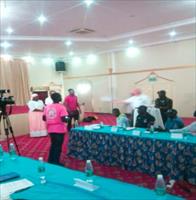The training of Gambian security forces on freedom of expression and the safety of journalists has ended on Saturday at the Jembe Hotel in Kololi.
Delivering her official closing statement, Fatou Jagne Senghore, Regional Director Article 19 West Africa, said they have to put the pillars of a new relationship that could strengthen the work of these two important stakeholders, (the media and security services).
She said the initiative aims at improving capacities of security forces in The Gambia to guarantee freedom of expression and the safety of journalists in the context of the implementation of the UN Plan of Action on the safety of journalists and the issue of impunity, endorsed in April 2012 by the Chief Executive Board of all UN bodies. “This UN Plan is a unique mechanism and the first attempt to systematically bring together all stakeholders, including the UN system, member states, international and regional organizations, academia, and the media itself to solve the challenges of safety of journalists and combating impunity at the global, regional and national level.”
The training coordinated by ARTICLE 19, was the third in West Africa after Senegal and Mali in April this year.
Mary Anne Njie, who spoke on behalf of the participants, said the workshop has created the enabling environment for both the security and the media personnel to network and experiences over the years the Gambian media has been sideline, mistreated and abused.
The security personnel have been accused of so many issues and the training has created faster ways to eradicate unprofessionalism in both the security and media personnel.
Ms Njie said as participants, they promise to build a better relation for a democratic Gambia and they recognised the guidelines in the training for security forces in relation with media professionals that guarantees freedom of expression and safety of journalists.
“We have learned new ways of obtaining information from security forces and we have learned how to deal with journalists professionally,” she said.
“We have also learned more on access to information and the welfare of media and how to disseminate information on better working relation with the security forces,” she added.
Leszek Bialy, representing UNESCO, said the during the training session, they have a good interaction with the experts on everything related to freedom of expression, the safety of journalists and the relationship between the security forces and the media professionals in The Gambia.
He said promoting the safety of journalists and combat the impunity of those who attack them are central element of UNESCO action to support press freedom across all media platforms.
“Ensuring citizen access to information means givingaccess to development, which is the strengthened of local media.”
Author: Njie Baldeh

